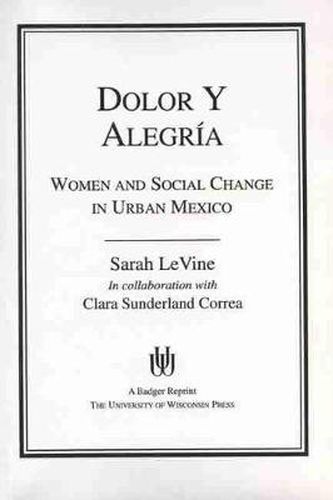Readings Newsletter
Become a Readings Member to make your shopping experience even easier.
Sign in or sign up for free!
You’re not far away from qualifying for FREE standard shipping within Australia
You’ve qualified for FREE standard shipping within Australia
The cart is loading…






This title is printed to order. This book may have been self-published. If so, we cannot guarantee the quality of the content. In the main most books will have gone through the editing process however some may not. We therefore suggest that you be aware of this before ordering this book. If in doubt check either the author or publisher’s details as we are unable to accept any returns unless they are faulty. Please contact us if you have any questions.
In
Dolor y Alegria
(Sorrow and Joy), 15 mothers, grandmothers and great-grandmothers in the Mexican City of Cuernavaca speak about the dramatic effects that urbanisation and rapid social change have had on their lives. Sarah LeVine combines these autobiographical vignettes with ethnographic material, survey findings and her own observations. The result is a vivid picture of contrast and continuity. While many earlier publications have focused on the poor of Latin America who live at the margins of urban life,
Dolor y Alegria
explores the experiences of ordinary working and lower-middle class women, most of them transplanted from villages and small towns to a densely populated city neighbourhood. In their early years, many experienced family disruption, emotional deprivation and economic hardship; but steadily increasing educational opportunities, improved health care and easily available contraception, have significantly altered how the younger women relate to their families and the larger society. Today’s Mexican schoolgirl, LeVine shows, is encouraged to apply herself to her studies for her own benefit, and the longer she remains in school, the greater the self-confidence she will carry with her into the world of work, and later, into marriage and motherhood. Hard economic times have forced many married women into the workplace where their sense of personal efficacy is enhanced; at the same time, in the domestic sphere, their earnings allow them greater negotiating power with husbands and male relatives. Changes are not confined to the younger generation. Older women are enjoying better health and living longer; but with adult children either less able or willing to accept responsibility for aged parents than they were in the past, anxiety runs high and family relations are often strained.
Dolor y Alegria
takes a close look at the efforts of three generations of Mexican women to redefine themselves in both family and workplace; it shows that today’s young woman has expectations of herself and others very different from those that her grandmother or even her mother had.
$9.00 standard shipping within Australia
FREE standard shipping within Australia for orders over $100.00
Express & International shipping calculated at checkout
This title is printed to order. This book may have been self-published. If so, we cannot guarantee the quality of the content. In the main most books will have gone through the editing process however some may not. We therefore suggest that you be aware of this before ordering this book. If in doubt check either the author or publisher’s details as we are unable to accept any returns unless they are faulty. Please contact us if you have any questions.
In
Dolor y Alegria
(Sorrow and Joy), 15 mothers, grandmothers and great-grandmothers in the Mexican City of Cuernavaca speak about the dramatic effects that urbanisation and rapid social change have had on their lives. Sarah LeVine combines these autobiographical vignettes with ethnographic material, survey findings and her own observations. The result is a vivid picture of contrast and continuity. While many earlier publications have focused on the poor of Latin America who live at the margins of urban life,
Dolor y Alegria
explores the experiences of ordinary working and lower-middle class women, most of them transplanted from villages and small towns to a densely populated city neighbourhood. In their early years, many experienced family disruption, emotional deprivation and economic hardship; but steadily increasing educational opportunities, improved health care and easily available contraception, have significantly altered how the younger women relate to their families and the larger society. Today’s Mexican schoolgirl, LeVine shows, is encouraged to apply herself to her studies for her own benefit, and the longer she remains in school, the greater the self-confidence she will carry with her into the world of work, and later, into marriage and motherhood. Hard economic times have forced many married women into the workplace where their sense of personal efficacy is enhanced; at the same time, in the domestic sphere, their earnings allow them greater negotiating power with husbands and male relatives. Changes are not confined to the younger generation. Older women are enjoying better health and living longer; but with adult children either less able or willing to accept responsibility for aged parents than they were in the past, anxiety runs high and family relations are often strained.
Dolor y Alegria
takes a close look at the efforts of three generations of Mexican women to redefine themselves in both family and workplace; it shows that today’s young woman has expectations of herself and others very different from those that her grandmother or even her mother had.